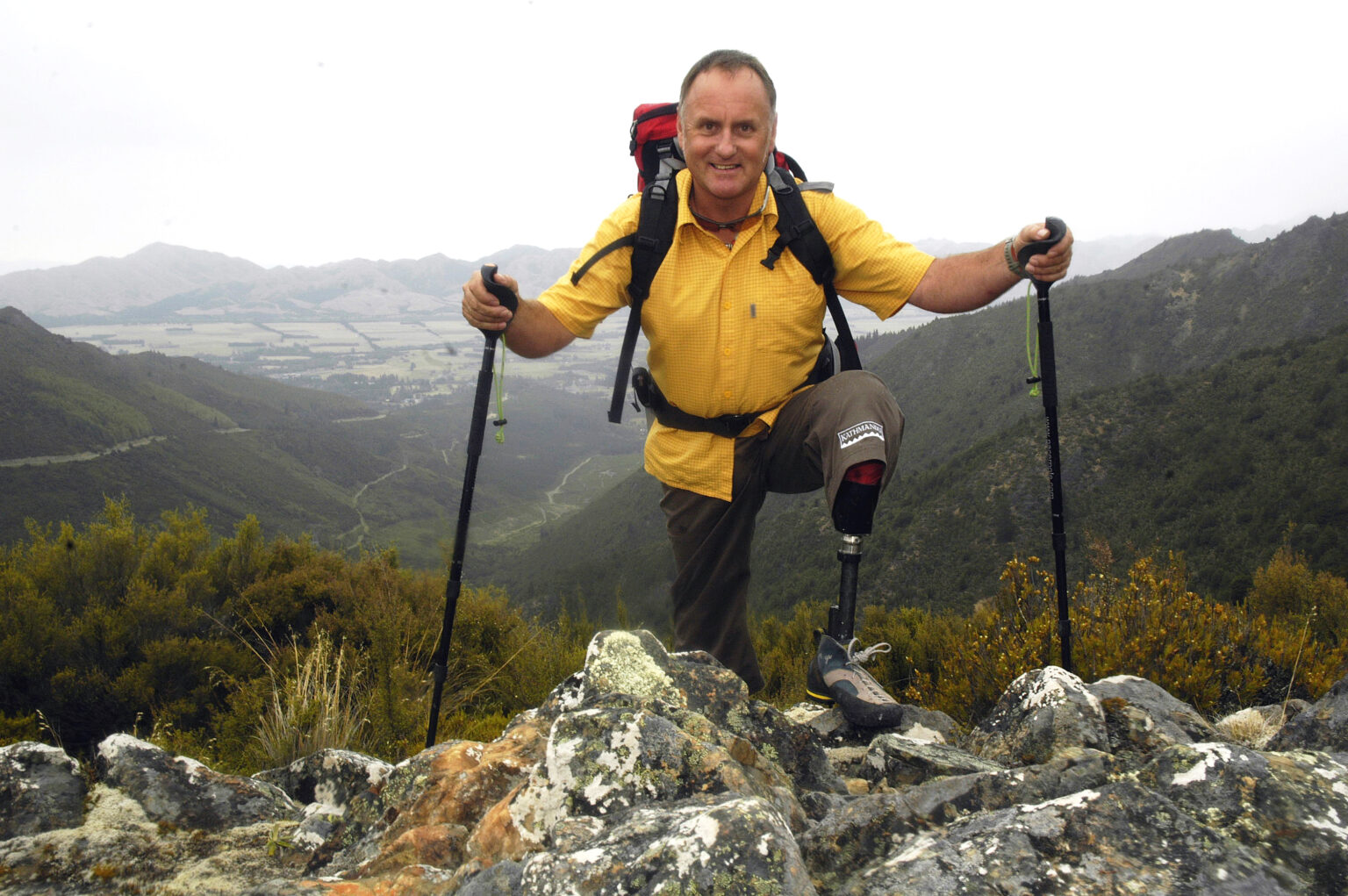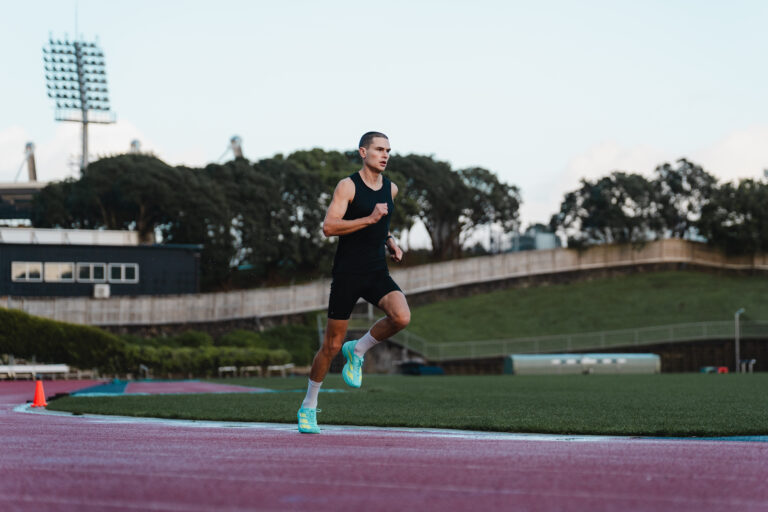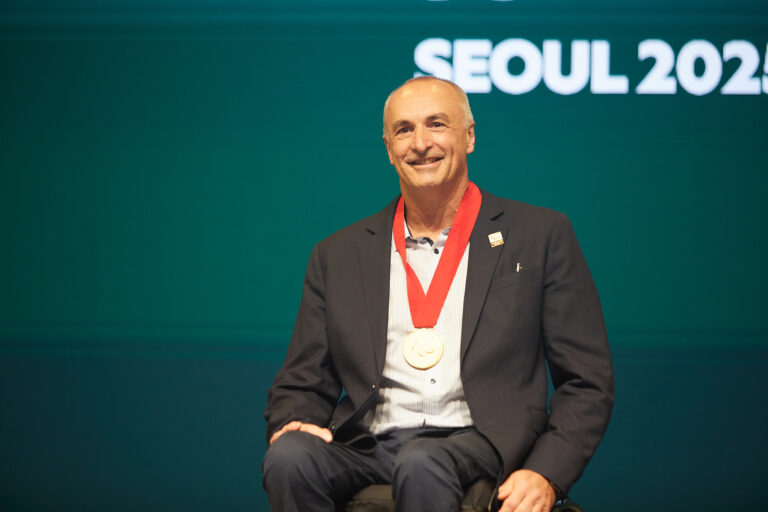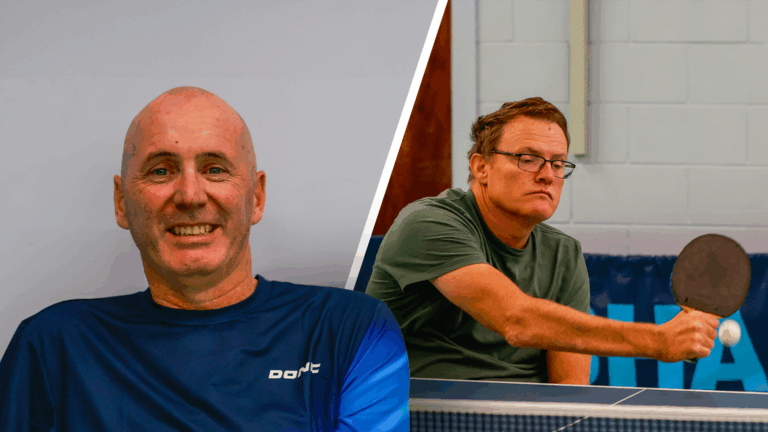Overcoming intense adversity to achieve jaw-dropping accomplishments is a defining trait of many of our Paralympians — but few embody this spirit more powerfully than Paralympian #124 Mark Inglis ONZM.
Carving out a distinguished reputation as a scientist, adventurer – he was the first double amputee to climb Mt Everest – winemaker, author, public speaker and disability advocate, there is very little the remarkable South Islander has not achieved.
Yet one of his proudest was scaling another major peak to secure New Zealand’s first ever Para cycling medal at a Paralympic Games when taking silver in the Mixed 1000m Time Trial LC3 in his first competitive race over the distance at Sydney 2000.
“I knew I had a chance of going well but never in my wildest dreams did I think I would do as well as I did,” says Mark who was aged 41 at the time.
Growing up the youngest of three children in the small South Canterbury town of Geraldine, Mark admits “he sucked” at both rugby and hockey but found a passion for mountaineering thanks to the enthusiasm of geography teacher at Geraldine High School.
Finding an outlet for his restless nature, he rapidly built up his skills to move “seamlessly through the mountains”, and after leaving school he started work as a search and rescue mountaineer for Aoraki/Mt Cook.
Yet in 1982 while attempting to climb the mountain with his partner Phil Doole, the pair became trapped in a crevasse for 13 days due to horrific weather. In a well-documented story that was extensively covered by the media, the pair were rescued but suffering from severe frostbite, both Phil and Mark had their legs amputated below the knee.
Aged 23 at the time, Mark admits to experiencing some “dark times” in the aftermath of the amputation. Yet possessing what he calls the “over-confidence gene” he preferred to focus on the positives.
“As I always say the best person to have their legs cut off at 23 is probably a young mountaineer because you are used to putting yourself in challenging situations, positions where you could potentially die,” he explains. “Having pragmatic mountaineering skills probably made me cope with my new circumstances a little easier than it would for others.”
Leaving hospital after just 11 weeks, he had his new legs fitted and returned to work on Mt Cook as a duty ranger. However, frustrated in the role he took up an opportunity thanks to ACC support to study an Agriculture and Horticultural Science degree at Lincoln University.
Education opened a new world of possibilities for Mark and after a year he pivoted to studying an honours degree in biochemistry.
“I love to learn and after I discovered science, I immersed myself in that, as I tend to do,” he explains. “Biochemistry is a form of chemistry that applies to everything we do, it is the basis of all life.”
Successfully completing his honours degree at the School of Medicine in Christchurch he later studied for a PhD and became a scientific officer studying stem cell research. Yet in typically restless fashion Mark sought a new challenge and in the early 1990’s he switched to a new career path.
Having being inspired by reading the Dick Francis novel Proof – which was centered on a wine merchant – and with a background in biochemistry, he successfully applied for a job as a trainee winemaker at Montana Wines in Blenheim. For the next decade he rose from trainee to cellar master, winemaker and senior winemaker.
“During my time there we become a collaborative company, but this was phenomenally important because it gave me a greater insight into psychology and industrial psychology which I have been able to use in all areas of my life,” he explains of his time at Montana Wines.
Yet hankering for something else, his focus shifted to Para cycling. In the late-1970s and early 1980s Mark had been a keen mountain biker, and post-amputation he regularly used a road bike. It was after approaching Paralympian #99 Ben Lucas (who was then working for ParaFed Canterbury) of his desire to engage in the Para sport, he discovered a fledgling Para cycling programme had been set up in Aotearoa New Zealand.
Paralympian #125 Paul Jesson – who had previously raced in the Tour de France – was part of the programme, but in 1997 Mark set out to prove his worth as a Para cyclist.
Training on an asphalt cycle track around a 400m grass athletics track at Athletic Park in Blenheim was far from ideal. The steepest part of the track was not as steep as the start-finish straight of a standard indoor velodrome, but he was fortunate to have a “phenomenal coach” in Tony Catterick.
“Tony was an ex-pro cyclist and he was fantastic,” recalls Mark. “He never had to tell me how to race hard, he just had to tell me how to race smarter. We quickly worked out my best event was the kilo (1,000m time trial). I could knock out my first lap two to four seconds quicker than anyone, but then I slowed up against the single leg amputees and I just had to hang on in the latter stages.”
Selected for the NZ Paralympic Team at Sydney 2000 on potential – he had no recorded official competitive time for the 1000m Time Trial LC3 – he was one of seven unranked Para cyclists in the field of 17. Yet in the days leading up to race day he had built up a quiet confidence during training sessions at the Dunc Gray Velodrome in Sydney.
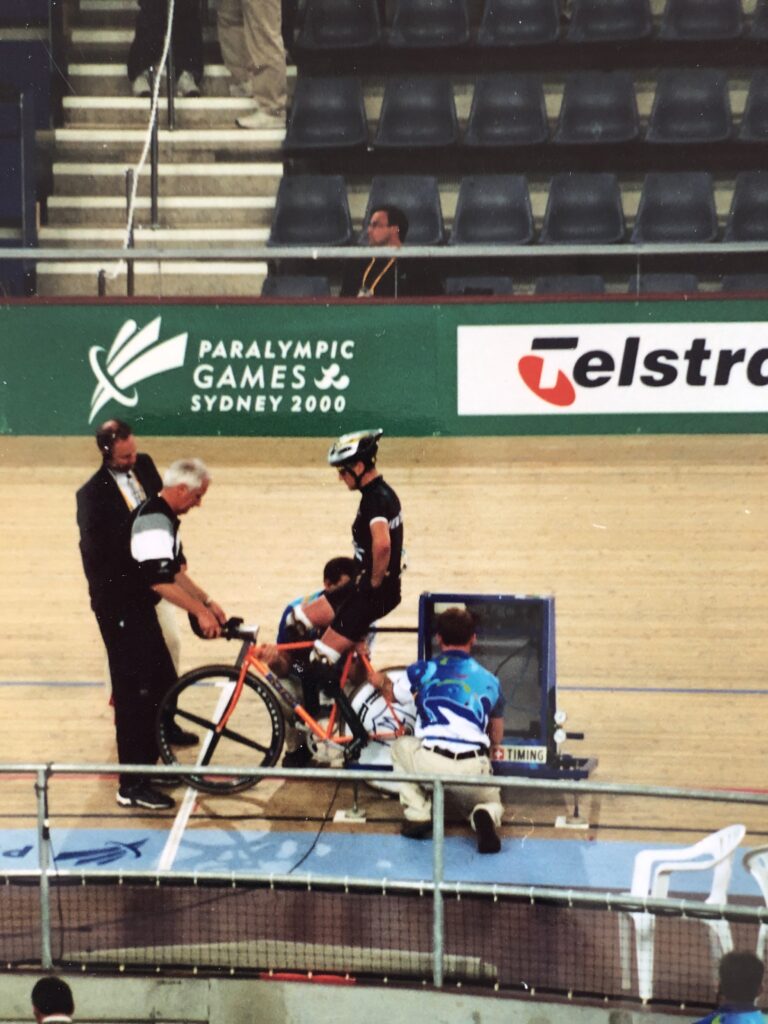
“If you had stitched together my personal best time on each lap in training it would have been a world record, so I knew I was going well,” he explains. “As an unknown I didn’t have a target on my back. I was a real dark horse.”
As an unranked rider Mark was one of the early riders to compete. Completing the four-lap distance in 1:23.169 he was delighted with the time but then had the agonising wait of watching the bulk of the rest of the field compete.
“I would see world ranked Para cyclists race, but they were recording times more slowly than my time,” he recalls. “All of a sudden I was in bronze and then silver.”
Unfortunately for Mark, Radovan Kaufman of Slovakia the final rider to start proved too strong, recording a time of 1:21.393 to strike gold. Yet winning a silver and making history as New Zealand’s first ever Para cycling medallist at a Paralympic Games was a huge moment for Mark.
“I call winning that medal the gateway to understanding how much I you could do with my life,” he says. “When you step up on to that world stage and deliver, it validates so much.”
Mark competed for one more season as a Para cyclist before his focus shifted to a new challenge – and in 2002 he became the first double amputee to climb Mt Cook. Yet this was not to prove the scale of his ambition, and four years later he successfully became the first person on prosthetic legs to reach the summit of Mt Everest.
“Having climbed Mt Cook I knew I could climb Everest too. But I knew I couldn’t just climb Everest, I would need to scale another 8,000m peak first,” he says. “After climbing Cho Oyu on my 45th birthday in 2004 I looked out over Everest and knew it was do-able. It was just like my Paralympic journey in that I ticked off lots of smaller goals en route to the big goal.”
Possessing seemingly inexhaustible energy Mark has for the past two decades devoted his time to a range of other projects. Working as the Founding Trustee and CEO for Limbs4All, the partner charity to Exceed Worldwide which provides resources and aid, such as prosthetics, to people with disabilities in developing countries, he is motivated to provide a better life for those with a disability.
He also works as a consultant with corporates fulfilling regular speaking engagements across Asia, Australia and Aotearoa New Zealand, promoting the Culture of Change.
Closer to his home in Hanmer Springs, which he shares with his wife, Anne, he serves as Trail Manager for St James Trails Trust which manages the St James Cycle Trial, one of the 23 Great Rides. Meanwhile, he has also helped create a charitable trust to help restore the Queen Mary’s Hospital in the town which was built in 1916 for traumatised servicemen returning for World War I. Later operating as an alcohol and drug dependency unit, the hospital closed in 2003, but keen to a revive the historic building the charitable trust helped raise $3.9 million to refurbish the Soldiers Block into a community facility.
The trust plans to raise a further $8m to create an immersive from “the darkness to the light” experience in the Soldiers Block and creating a lively hub for Hanmer Springs.
Yet to “recharge my batteries” he turns to his work with St James Cycle Trail which had fallen into a state of disrepair for more than a decade because of a lack of resources. One of New Zealand’s Great Ride Initiatives, Mark helped set up St James Trails Trust – who have been entrusted the cycle trail from the Department of Conservation – a cause Mark is very passionate about.
“We are bringing the trail back to life,” he explains. “I’m never happier when heading out to the big country and working on the cycle trail.”
Now aged 65 Mark is certainly showing no signs of slowing down and even now as a pensioner he has some big goals yet to fulfil.
“My next Everest is changing people’s perceptions of disability,” he explains. “I’m a great advocate for not using the word disabled and instead using the term people with a disability, because it is the person that comes first. People with a disability don’t know how much more they can do, and they are often constrained by people giving them poorly informed advice. That is the next challenge and something I hope to try and change.”
Given his remarkable life story so far, few would bet against Mark achieving his next Everest.
***To find out more about Para cycling go here.

